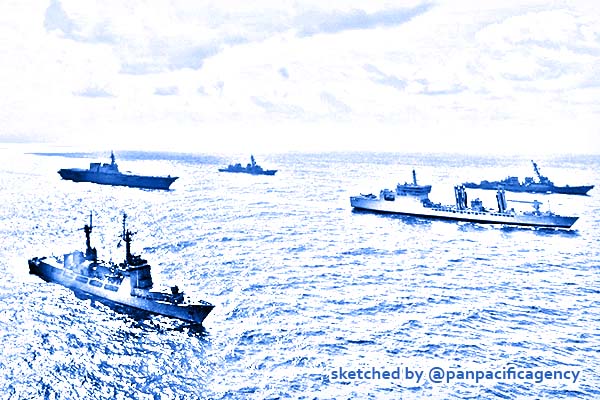Vietnam rejects China’s ‘historical evidence’ argument in the South China Sea

Ships from four nations – the Philippines, the US, Japan and India – sail together in the South China Sea during a training exercise on May 9. Photo: Handout. Sketched by the Pan Pacific Agency.
HANOI, Jul 17, 2020, The Hanoi Times. Vietnam emphasizes that all countries have a common duty and obligation to respect the basic principles of international law, The Hanoi Times reported.
Vietnam explicitly rejects what China has shamelessly argued it has a long history in the South China Sea as the two neighboring nations have been entangled in a long territorial dispute.
“Vietnam has sufficient historical evidence and legal basis to assert its sovereignty over Hoang Sa (Paracel) and Truong Sa (Spratly) archipelagos in accordance with international law,” Spokesperson Le Thi Thu Hang of Vietnam’s Ministry of Foreign Affairs said at a regular press conference on Thursday.
Hang reasserted Vietnam’s sovereignty in the South China Sea when answering a question on blatant fabrication by Chinese Foreign Ministry’s Spokeswoman Hua Chunying on Twitter where the Chinese diplomat said China has presence in this vital sea dated back 2,000 years.
“We advocate that all countries have a common duty and obligation to respect the basic principles of international law,” Hang added.
In addition, Hua Chunying tweeted baselessly that China “reclaimed Nansha and Xisha because of Japanese occupation”. These two islands refer to Vietnam’s Truong Sa and Hoang Sa.
In fact, numerous documents and historical evidence have proved that both islands are under Vietnamese legal sovereignty for centuries.
China illegally occupied Paracels since 1974 while some of the Spratly islands have also been illegally seized and constructed by Beijing.
The Chinese spokeswoman, through a series of tweets, also criticized the US after the US Department of State announced its position on the South China Sea on July 13.
On July 13, for the first time, the US made their policy on the South China Sea crystal clear. Thereby, Washington rejected China’s claim to most of these waters and asserted that America stands with its Southeast Asian allies and partners in protecting their sovereign rights to offshore resources.
US Secretary of State Mike Pompeo added that China has no legal grounds to unilaterally impose its will on the region. Beijing has offered no coherent legal basis for its “Nine-Dashed Line” claim in the South China Sea since formally announcing it in 2009.
He stated that the US rejects any Chinese claim to waters beyond a 12-nautical mile territorial sea derived from islands it claims in the Spratly Islands (without prejudice to other states’ sovereignty claims over such islands). As such, the United States rejects any PRC maritime claim in the waters surrounding Vanguard Bank (off Vietnam), Luconia Shoals (off Malaysia), waters in Brunei’s EEZ, and Natuna Besar (off Indonesia).
Regarding Mike Pompeo’s statement, Vietnamese Foreign Ministry’s Spokesperson Le Thi Thu Hang stated Vietnam welcomes countries’ positions on the East Sea issues which are consistent with international law and shares the view, as stated in the statement issued on the occasion of the 36th ASEAN Summit, that the UNCLOS sets out the legal framework within which all activities in the oceans and seas must be carried out.”
Following the US statement, several Southeast Asian countries such as Vietnam, Malaysia, the Philippines, and Indonesia voiced their support for the US position, welcoming the White House’s tough move and argued that the disputes must be resolved based on international law.
The US government doubled down on its rejection of Chinese maritime claims in the South China Sea, with a senior official warning that Washington could respond with sanctions against Chinese officials and enterprises for coercive acts, Nikkei reported.